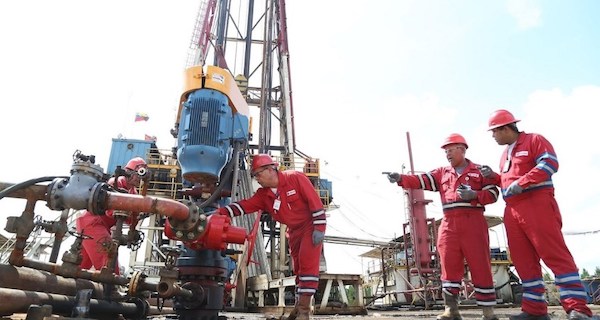The international news agency Reuters has confirmed that Venezuela’s U.S.-appointed coup leader Juan Guaidó and his right-wing economic advisers drafted a plan to privatize the country’s petroleum industry and open up the oil-rich South American country to foreign corporations.
This privatization scheme will be difficult to implement, however, given the Venezuelan government still remains under the control of its elected leftist president, Nicolás Maduro, and the coup attempt led by the Donald Trump administration has thus far failed.
The Grayzone reported on the opposition’s moves to try to privatize Venezuela’s oil industry immediately after the coup attempt began nearly two months ago, at a time when corporate media outlets were largely ignoring this key detail and instead portraying the conflict as a supposed “humanitarian crisis.”
In a March 12 report titled “Venezuela’s Guaido readies to open up oil industry after years of nationalization,” Reuters outlined plans by the opposition to partially privatize Venezuela’s state-owned oil company PDVSA.
Reuters euphemistically noted, “The proposal could provide ammunition for Maduro’s claims that Guaido is a puppet for foreign interests.”
The news agency obtained a copy of the U.S.-backed opposition’s privatization proposal, and detailed it as follows:
Under the proposal, which is expected to be released and discussed at Venezuela’s National Assembly in coming days, private firms could choose to run the day-to-day operations of Venezuelan oilfields, a sharp departure from the Chavez era in which foreign companies could only hold minority stakes and were not granted operational control.
Guaido’s team is proposing a variety of exploration and production contracts to allow private companies for the first time in decades to operate oilfields individually and in partnership with PDVSA. Private companies could also apply to operate oil refineries and retail service stations under the draft proposal.
Reuters also quoted the neoliberal Harvard economist Ricardo Hausmann, who serves as the coup regime’s delegate to the Inter-American Development Bank and is playing a leading role in the oil privatization scheme.
“We need to open up the oil industry to private investment,” Hausmann insisted. Reuters said that the right-wing economist told an energy conference “that PDVSA’s role had to be limited due to its operational and financial weakness.”
As Anya Parampil detailed for The Grayzone, Hausmann “is one of the West’s leading neoliberal economists, who played an unsavory role during the 1980s and ’90s in devising policies that enabled the looting of Venezuela’s economy by international capital and provoked devastating social turmoil.”
Guaidó advisor @ricardo_hausman recently told Reuters "we need to open up the oil industry to private investment."
He said the same thing at a Big Oil-backed event in November, when he foretold the date of Guaidó's coup plot months before it happened.
https://t.co/IIpKknzat4 pic.twitter.com/MD9IDzB28x— Anya Parampil (@anyaparampil) March 13, 2019
The opposition plans would create a new regulator called the National Hydrocarbon Agency, which would have the authority to auction off all oil reservoirs in Venezuela.
The proposal would also let the coup regime completely remake PDVSA, allowing it to reorganize the company, renegotiate its debts, suspend existing so-called “harmful contracts,” and change its relations with current partners—such as Chinese, Russian, and Iranian companies.
This privatization scheme in Venezuela would be similar to the one pursued by Mexico’s right-wing former President Enrique Peña Nieto, Reuters noted, who partially privatized Mexico’s state-owned oil industry.
Venezuela has the world’s largest oil reserves. Reuters reported that 90 percent of Venezuela’s export revenue comes from oil, and amid crippling U.S. sanctions and economic warfare, production is at its lowest level in 70 years.
The news agency comically added, “However, the plan’s impact will remain symbolic as long as Maduro remains in power,” given the elected president still “continues to control Venezuela’s military and its oilfields.”

